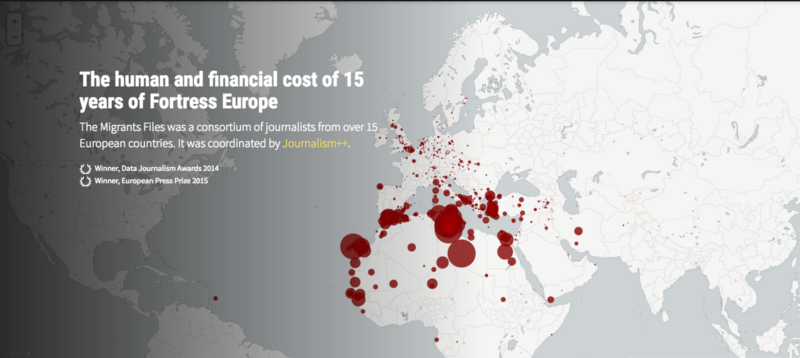How many migrants are there? Where do they come from? What routes do they take? What do they need? How do they integrate in their new countries? What are their final destinations? Who are they? – To help migrants, you need to understand them. And that’s the biggest challenge.
 Screen capture of The Migrant Files
Screen capture of The Migrant Files
Data enables us to better understand migrations and migrants’ needs.
Because migration is rarely declared and is managed by governmental organizations, NGOs and associations don’t work together and lack funding, professionals and volunteers don’t have access to the data they need to analyze behaviors and obtain accurate information.
On September 15th, we, Techfugees France, organized with Data4good a talk to raise awareness on the importance of data to help refugees. A mixed crowd of analysts, migration professionals, and volunteers were there.
Even if obtaining information on migration is extremely difficult because sharing info about their life can put migrants in danger (human trafficking, repression from their home countries, illegality…), it is essential in order to offer services and products that answer migrants’ needs.
Data journalism
Data journalism is a type of journalism based on the use of data. The journalistic company J++ used this approach to investigate migration.
During our event, their CTO, Pierre Roméra, presented The Migrant Files, a consortium of European journalists who investigated for two years on the cost of the fight against immigration. A first investigation, called Counting the Dead, counted the number of people who died trying to get into Europe and highlighted the most dangerous places to cross the border for migrants. A second one, called The Money Trail, showed the financial cost of European politics to stop immigration. The results of those investigations could help politicians adapt their politics to save lives and money.
Gathering the data wasn’t easy. For Counting the Dead, they had to use the data gathered by journalists and migration organizations. Because it isn’t their job, they have a hard time structuring that data.
The Migrant Files team had to structure the database, and reformat and cross-check the data. Then they had to delete the duplicates and check via press articles if those deaths truly did happen and if more info was available. A daunting job that reminds us that time, patience, and technical knowledge are needed to create a clean and usable database.
In the end, the consortium counted 30,000 deaths since 2000. The second investigation estimated that border protection cost 1.3 billion Euro at least since 2000. Those figures are imperfect, many more deaths and expenses weren’t taken into account for a lack of information.
So what is the use of this information?
Giving journalists the info they needed to become experts on migration and raise awareness wasn’t the main goal. J++ wanted to prove that the political institutions could do this as well but simply didn’t want to gather this information.
Data guiding social entrepreneurs
Data is useful in many other sectors. Techies could also exploit the data power to evaluate the migrants’ needs and improve their products and services.
Data for good is a non-profit that gathers over 250 data scientists looking to volunteer to help solve social problems.
One of their initiatives is a 10-week accelerator that enables social business managers to be followed by mentors (Bayes Impact, Snips, Etalab), to attend workshops, and to use a workspace at Liberté Living Lab in Paris. The program ends with a Demo Day that welcomes 200 to 300 people.
In early October, Data for good kicked off the second season of this acceleration program and two migration-related projects were selected:
- Basefugees is the platform, launched in beta in June 2016 by Techfugees, that mobilizes the tech community and helps NGOs deal with the challenges of this crises.
- Quickbed is a free platform that connects immigration players with emergency housing solutions to allow cheaper and smarter integration. Thanks to Data for good, founder Paul-Emmanuel Levy will bring to life a project called Newbed. Newbed spots hotels that could host migrants.
Now, have YOU thought about how you can leverage data to improve your solution?
By Aline Mayard
Related event
TF France: Data4Good event in September 2016